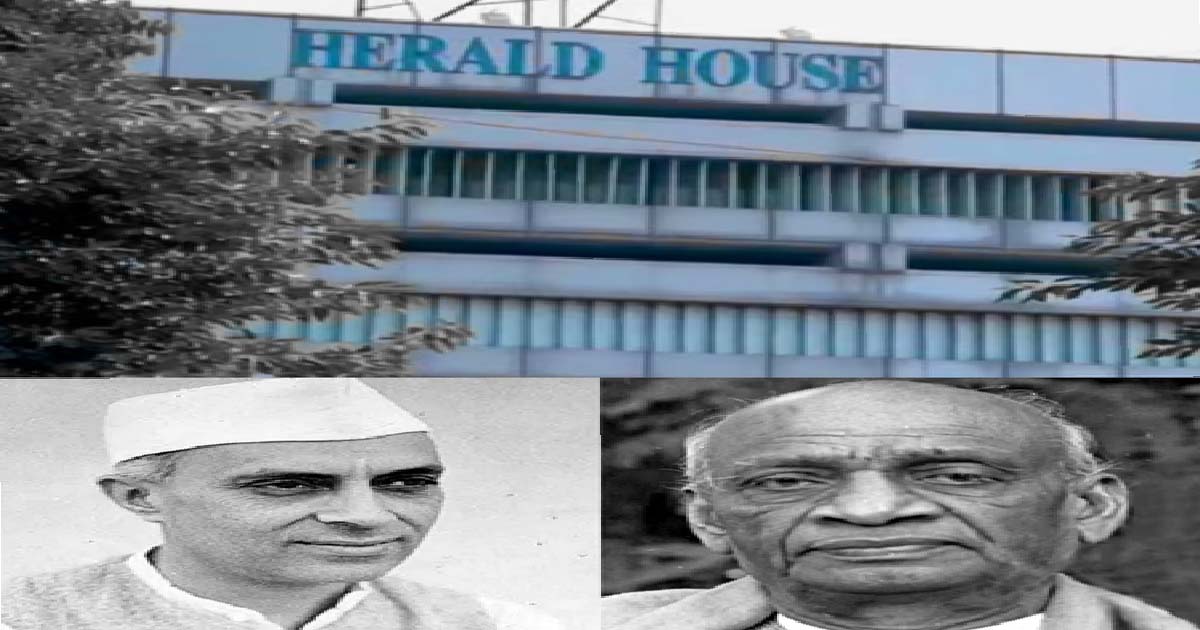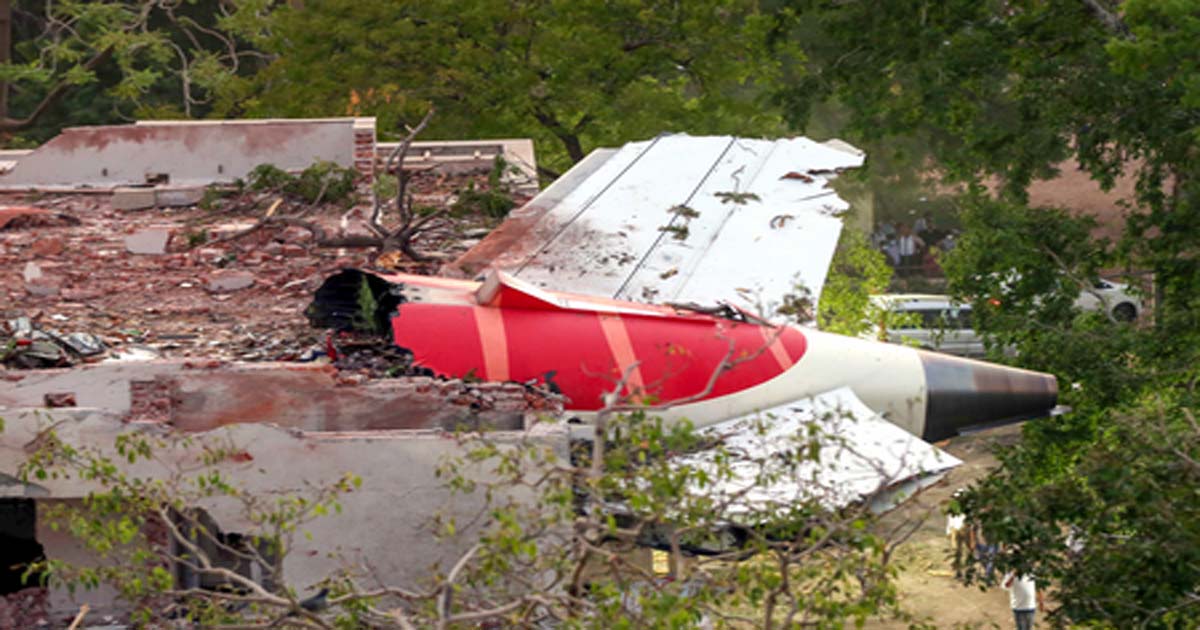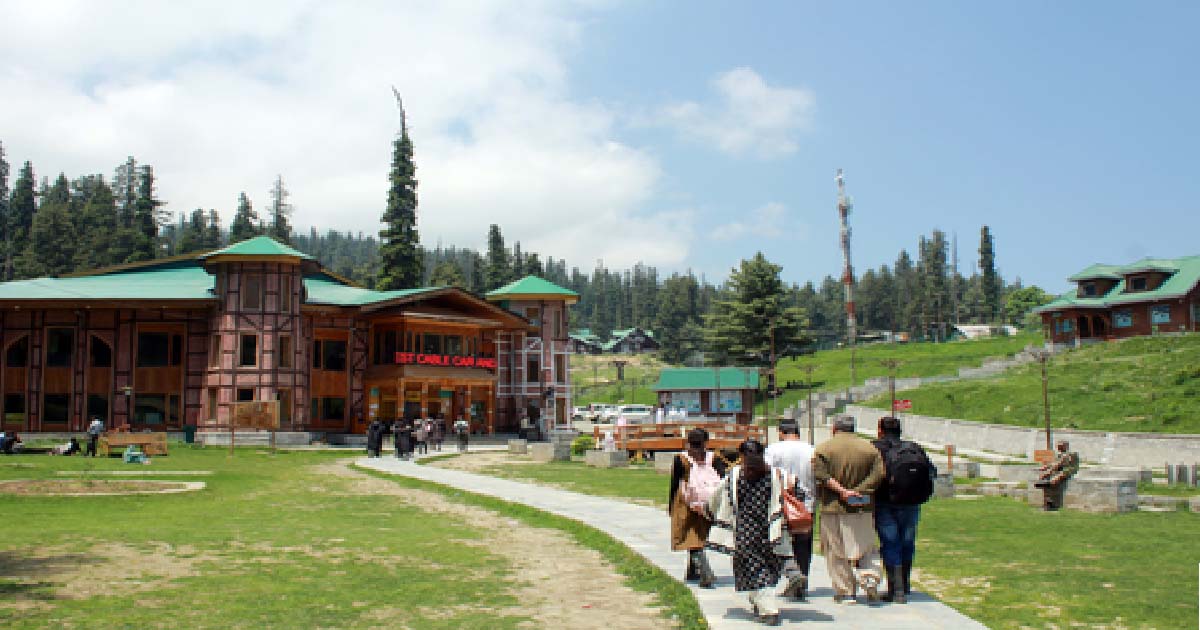National News
Patel’s alarm, Nehru’s ‘dismissal’: The origins of the National Herald storm

New Delhi, April 17: A series of letters exchanged between Sardar Vallabhbhai Patel and Jawaharlal Nehru in May 1950, as documented in the book Sardar Patel’s Correspondence, suggest that Patel expressed concerns to Nehru regarding the use of the ‘National Herald’ for fundraising purposes. These letters indicate that Patel cautioned Nehru about “the potential misuse of government influence in financial dealings” and advised against accepting contributions from “questionable” sources.
The old correspondence between Sardar Patel and Jawaharlal Nehru has resurfaced at the heart of political debate, following the Enforcement Directorate’s chargesheet against former Congress leaders Sonia Gandhi and Rahul Gandhi. The charges, tied to alleged money laundering in the National Herald case, have brought renewed attention to Patel’s early warnings about financial misconduct linked to the publication—warnings that now seem strikingly relevant.
In fact, The National Herald has been entangled in controversy since the early days of independent India. Letters exchanged between Sardar Patel and Jawaharlal Nehru in 1950 are frequently referenced to point out that questions around the paper’s financial conduct and political misuse were being raised even then.
In 1950, Sardar Vallabhbhai Patel explicitly warned Jawaharlal Nehru about dubious fundraising tactics and the ‘misuse’ of government machinery to prop up the National Herald. These serious concerns revealed Patel’s clear discomfort with the ethical and political implications of such actions. Despite the gravity of the warnings, Nehru apparently chose to brush them aside.
Are Sardar Patel’s decades-old warnings proving to be prophetic? The question is echoing across political debates following the Enforcement Directorate’s chargesheet against Sonia and Rahul Gandhi, accusing them of orchestrating a “criminal conspiracy” to usurp properties worth Rs 2,000 crore belonging to Associated Journals Ltd (AJL), the publisher of the National Herald. What began as a stern caution from one of India’s foremost statesmen in 1950 has, according to political analysts referencing Patel’s letters, now spiralled into an allegedly full-blown scandal that “underscores a legacy of alleged misuse of power and political entitlement”.
Sardar Vallabhbhai Patel raised the red flag in a series of pointed letters to Prime Minister Jawaharlal Nehru. On May 5, 1950, Patel wrote to Nehru expressing grave concern over a Rs 75,000 donation to the National Herald from two individuals associated with Himalayan Airways. The airline had reportedly obtained a government contract for night air mail services by circumventing objections from the Indian Air Force. Observers say that it was an early sign of “political favouritism and backroom dealings”.
Patel didn’t mince words. He highlighted that one of the donors, Akhani, was already facing multiple charges of bank fraud. Even more damning was Patel’s accusation that Union Minister Ahmed Kidwai was abusing his official position to collect funds for the Herald, including money from controversial businessmen in Lucknow such as J.P. Srivastava.
Nehru’s reply, sent the same day, was “vague and dismissive”– attempting to pacify Patel without allegedly addressing the core concerns. He mentioned having asked his son-in-law, Feroze Gandhi, then General Manager of the Herald, to look into the matter. According to an analyst, Nehru’s tone as reflected in the letter was non-committal, brushing the issue aside as though it were an unfortunate misunderstanding.
Patel, undeterred, responded the very next day, May 6, 1950. He saw through the deflection as he wrote to Nehru in detail, explaining how certain private companies and their shareholders were involved in the process. Sardar Patel noted, “Some contributions did not come from those involved in running the department. Otherwise, to my knowledge, the number of contributions received was sufficient and involved other individuals as well. The transactions I have referred to are of a different nature. There is no element of charity in them.”
In his follow-up, Nehru again “tried to distance himself from the paper and its finances”, claiming he hadn’t been involved with the National Herald or its fundraising for three years and had passed the responsibility to a woman named Mridula. He admitted “some mistakes may have occurred” but continued to what was seen by many as his attempt to “justify” the questionable transactions as part of a legitimate business proposition, even calling it a matter of “loss and profit” — not charity.
This point was highlighted by BJP national spokesperson Sudhanshu Trivedi who stated that on May 6, 1950, Jawaharlal Nehru wrote a letter to Sardar Patel saying, “Herald is a good business proposition and its preference shares and debentures are not a bad investment.”
It was said during Nehru’s time that the investment made in the National Herald could be profitable. This is a good business investment, so its shares or debentures cannot be considered harmful, said Trivedi referring to correspondence.
The direct implication is that from the very beginning, this investment was linked to profit, business, and property, he added. “Today, the Congress party should be asked this ethical question: when this was always a business plan, how can it suddenly be linked to charity or donations given during the freedom struggle?” he said.
This was the breaking point for Patel.
In his final letter dated May 10, 1950, he made it clear that the issue was about integrity, accountability, and the misuse of political power. As Home Minister, he expressed deep concern over the ‘dishonesty’ surrounding the Herald’s funding and the dubious individuals involved.
He rejected Nehru’s defence outright, calling out the rot at the core of what was being portrayed as a freedom movement legacy.
Sardar Patel wrote, “In light of these events, I do not think there is any benefit in pursuing this matter further. I have already told you how I view these activities, and I doubt that if this happened in any other province and I had any connection to it, I would not accept this situation.”
According to Trivedi, this clearly means that he had become disillusioned and did not want to talk about it again. “Now, Congress should explain what kind of sacrifice and dedication this was,” Trivedi asked.
According to political observers, Patel’s firm stance exposed a deeper malaise — a troubling pattern of entitlement, favouritism, and ethical compromise that would resurface decades later. His warnings, largely ignored at the time, now seem eerily prophetic.
National News
241 dead, one survivor as Air India Dreamliner crashes after takeoff from Ahmedabad: Air India

New Delhi, June 13: In what is being described as one of the worst aviation disasters in Indian history, an Air India Boeing 787-8 Dreamliner carrying 242 people crashed shortly after takeoff from Ahmedabad airport.
The aircraft, operating as Flight AI-171 from Ahmedabad to London Gatwick, plunged into a residential complex near BJ Medical College, killing 241 people on board.
The ill-fated flight had 230 passengers, 10 cabin crew, and two pilots. According to officials, only one person, a British national of Indian origin seated in 11A, survived the crash and is currently undergoing treatment at a local hospital.
The aircraft took off from Sardar Vallabhbhai Patel International Airport at 1.38 p.m. (IST) on Thursday before losing control moments later and crashing into a densely populated area, igniting a massive blaze and triggering emergency response teams across the city.
Air India confirmed the accident in an official statement on X: “UPDATE: Air India confirms that flight AI171, operating from Ahmedabad to London Gatwick on 12 June 2025, was involved in an accident. The 12-year-old Boeing 787-8 aircraft departed from Ahmedabad at 1338 hrs, carrying 230 passengers and 12 crew. The aircraft crashed shortly after take-off. We regret to inform that, of the 242 aboard, there are 241 confirmed fatalities. The sole survivor is being treated in a hospital.”
The airline also shared the nationality breakdown of passengers: 169 Indian nationals, 53 British, seven Portuguese, and one Canadian.
“Air India offers its deepest condolences to the families of the deceased. Our efforts now are focused entirely on the needs of all those affected, their families and loved ones. A team of caregivers from Air India is now in Ahmedabad to provide additional support,” the statement added.
The national carrier has pledged full cooperation with authorities investigating the cause of the crash and has established dedicated helplines for families seeking information.
Domestic callers can reach the support team at 1800 5691 444, while international callers are advised to dial +91 8062779200.
Regular updates will be provided through Air India’s official website and its X handle.
National News
Plastic nurdle spill from sunken cargo ship reaches TN’s Dhanushkodi sanctuary, raising alarm

Chennai, June 10: A plastic nurdle spill from the sunken cargo ship MSC ELSA 3 has spread into the newly declared Dhanushkodi Greater Flamingo Sanctuary in Ramanathapuram district, threatening one of India’s most fragile coastal ecosystems.
The MSC ELSA 3, a Liberian-flagged vessel, sank off the Kochi coast a few weeks ago while carrying 640 containers, including 13 with hazardous materials, 12 with calcium carbide, 367 tonnes of furnace oil, and 84 tonnes of diesel.
The ship’s cargo manifest remains undisclosed, fuelling speculation about the full extent of environmental risk.
Dhanushkodi Sanctuary, located within the Gulf of Mannar Biosphere Reserve, supports 128 species of birds — including Greater and Lesser Flamingos — and is home to sea turtles, crustaceans, molluscs, and fish. Its dunes, marshes, and seagrass beds form part of the Central Asian Flyway for migratory birds.
The nurdles — tiny plastic pellets used in industrial manufacturing — resemble fish eggs and can be deadly to marine life. When ingested, they cause internal blockages, starvation, and often death. They also absorb toxins, entering the food chain and posing long-term health hazards.
About 80 bags, each weighing 25 kilograms, have reportedly washed ashore along a 12-km coastal stretch. Affected sites include the Dhanushkodi old church, Irattaithalai, Mugandharayan Chathiram, Gothanda Ramar temple, and Patchappatti village.
Carried by ocean currents from the Thiruvananthapuram-Kanniyakumari coast, the spill now threatens the adjacent Gulf of Mannar Marine National Park, home to vital coral reefs and seagrass beds.
Experts warn these habitats could be smothered by plastic debris, blocking sunlight and disrupting photosynthesis.
Ramanathapuram District Collector Simranjeet Singh Kahlon said, “We’ve identified between 15 and 30 nurdle bags along the coast. A special team has been deployed for cleanup, and additional teams are monitoring for further debris.”
He urged the public not to panic, stating that swift action was underway.
The disaster evokes memories of the 2021 X-Press Pearl incident in Sri Lanka, where 1,680 tonnes of nurdles led to mass marine deaths and crippled fisheries.
Studies showed severe impacts on plankton and larval life forms, threatening entire food chains.
Cleanup efforts in Ramanathapuram face challenges due to the nurdles’ buoyancy and small size, worsened by monsoon waves that break them into microplastics.
With the 61-day annual fishing ban nearing its end, fishermen fear reduced fish catches and consumer hesitancy could harm their livelihoods if the spill worsens.
Environmentalists are calling for urgent intervention, cargo transparency, and long-term containment measures to prevent irreversible damage to one of India’s most critical marine ecosystems.
National News
Eight Punjab and Haryana HC judges take lead to boost Kashmir tourism post Pahalgam terror attack

Srinagar, June 9: To give a boost to Kashmir tourism post Pahalgam terror attack, eight judges of the Punjab and Haryana High Court are visiting the valley along with their families.
The visit of the legal personalities along with their families carries a powerful message for the revival of tourism in Kashmir, which got shattered after the Pahalgam terror attack.
On April 22, Pakistan-backed terrorists of Lashkar-e-Kashmir (LeT) killed 26 civilians, including 25 tourists and a local pony owner.
The pony owner sacrificed his life while trying to protect the tourists from the bullets of the terrorists.
The terror attack caused outrage in the entire country, and to avenge the killings of innocent civilians, the Indian Armed Forces carried out airstrikes against terror infrastructure in Pakistan under Operation Sindoor.
In retaliation for India’s attack on terrorist infrastructure, Pakistan resorted to heavy mortar shelling on civilian facilities in Poonch, Rajouri, Baramulla, Kupwara and Bandipora districts.
Eighteen civilians were killed in Pakistan shelling, 13 of them in Poonch district, in addition to the destruction of scores of homes, shops, a temple, a mosque, a church and a Gurudwara.
The itinerary of the visiting high court judges includes visits to the Mughal Gardens of Nishat and Shalimar, Shikara rides on the Dal Lake, a visit to the historic Pari Mahal and buying a few handicrafts at the local market.
There could be no better omen for the revival of tourism in Kashmir than the decision of the honourable justices of the High Court to come here along with their families.
Coinciding with the visit of these dignitaries, local tour and travel operators and hotel owners are reporting a gradual rise in the tourist bookings that had virtually stopped after the Pahalgam terror attack.
Tour and travel operators and others connected with the tourist industry have expressed hope that the visit by the most respected legal dignitaries, like the high court judges, will restore confidence among visitors, both domestic and foreign, that Kashmir is a safe tourist destination.
-

 Crime3 years ago
Crime3 years agoClass 10 student jumps to death in Jaipur
-

 Maharashtra9 months ago
Maharashtra9 months agoMumbai Local Train Update: Central Railway’s New Timetable Comes Into Effect; Check Full List Of Revised Timings & Stations
-

 Maharashtra9 months ago
Maharashtra9 months agoMumbai To Go Toll-Free Tonight! Maharashtra Govt Announces Complete Toll Waiver For Light Motor Vehicles At All 5 Entry Points Of City
-

 Maharashtra9 months ago
Maharashtra9 months agoFalse photo of Imtiaz Jaleel’s rally, exposing the fooling conspiracy
-

 Crime9 months ago
Crime9 months agoBaba Siddique Murder: Mumbai Police Unable To Get Lawrence Bishnoi Custody Due To Home Ministry Order, Says Report
-

 National News9 months ago
National News9 months agoMinistry of Railways rolls out Special Drive 4.0 with focus on digitisation, cleanliness, inclusiveness and grievance redressal
-

 Maharashtra8 months ago
Maharashtra8 months agoMaharashtra Elections 2024: Mumbai Metro & BEST Services Extended Till Midnight On Voting Day
-

 National News10 months ago
National News10 months agoJ&K: 4 Jawans Killed, 28 Injured After Bus Carrying BSF Personnel For Poll Duty Falls Into Gorge In Budgam; Terrifying Visuals Surface












